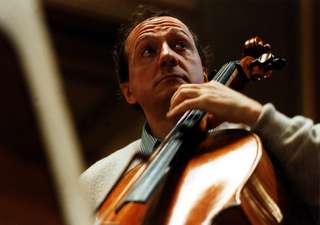|
Back
A Musical Magyar Szendvics New York
Theresa L. Kaufman Auditorium, 92nd Street Y
02/23/2010 -
Johann Sebastian Bach: Suite for Solo Cello No. 2 in D minor, BWV 1008
Zoltán Kodály: Sonata for Solo Cello Op. 8
György Ligeti: Sonata for Solo Cello
Johannes Brahms: Sonata No. 2 for Cello and Piano in F Major Op. 99
Miklós Perényi (Cello), Benjamin Hochman (Piano)

M. Perényi (© Andrea Felvegi)
The rarity of a solo performance by Miklós Perényi in New York is inexcusable. He is well known as a long-time collaborator with András Schiff (who will be giving his own recitals this month at the 92Y). But to hear this most distinguished cellist play a program of solo music–literally solo cello music–is to go back to a different era in cello performances.
Not that Mr. Perényi is an old-timer. But these past decades have generated the Personality Cult of the cello, not the classical cellist by itself. Nobody regrets the Promethean gestures of Rostropovich or the angelic poetry of Yo-Yo Ma, the political playing of Pablo Casals or even that naked cellist (whose name I forget).
But Miklós Perényi takes after another cellist, Pierre Fournier, for whom the word “distinguished” does not do justice. I was a child when I heard him, but still remember the sounds of the cello and the wondrous phrasing and fine classical ideals. I don’t remember what he looked like, or any flamboyant gestures.
Miklós Perényi has that rare great classical quality, found all too infrequently in Budapest today, since most of the eminent musicians soon emigrate to West Europe or America. But Mr. Perényi has felt an obligation to remain in the Liszt musical academy, albeit with ventures to concert halls, or recording studios, usually with Mr. Schiff.
Not last night, though. Classical he might be, but he didn’t hesitate in programming a Magyar musical Szendvics–a musical Hungarian sandwich. The two slices of “bread” were two old standbys, Bach and Brahms. But the paprikát and vörösbor (peppers and red wine) were a pair of Hungarian composers that gave a special verve to the evening.
Zoltán Kodály’s Solo Cello Sonata is relatively well known, and a treat for any audience. Whereas Béla Bartók evolved out of Hungarian folksong, Kodály–a highly sophisticated, polylingual intellectual–thrived on the songs of his research and his youth. Thus this sonata is immediately accessible, and is immediately a crowd-pleaser.
Still, it must be a chore for any cellist, who has to tune the lower strings down half a step, and who has to use the open strings as a drone or accompaniment. Yet. Mr. Perényi played it with utmost aplomb, not with flash or flying fingers, or as a tour de force but as a classical work which evolved into something more glittering.
And true, that last movement, a gypsy-style dance using every trick in the cellist-handbook, gets audience attention like a terrific magic trick. But Mr. Perényi gave it honest integrity.
I think that György Ligeti’s Cello Concerto is one of the greatest cello works of the 20th Century, but this early nine-minute Sonata, which was new to me, isn’t anywhere near so ambitious. In fact, it’s a simple piece. The first movement meter is regular, and the two little themes alternate from high to low strings, like a conversation. It was the second movement, a wild capriccio, where Mr. Perényi again played with an offhand facility. One section, where the double-stops alternated with different registers from top to bottom was played so effortlessly that one could only gauge its brilliance after the work was done.
These were terrific pieces. But Mr. Perényi brought another voice entirely to the “sandwich” works. Bach’s Second Suite is not as outgoing as some, and that fit the cellist fine. His tone is large but not shattering, his lines are always clear (perfect for the Prelude with its wealth of ideas), but he has such unheralded mastery that the Courante ran through the slurs and sixteenth-notes without a pause. He simply played the work, not digging into the chords, not pausing for effect. Nor did his stolidity disappear with the final jig, which was anything but droll, but always elegantly danceable.
The final piece (outside of an encore from Chopin’s Sonata) was a surprise. We had been so used to hearing the solo cello that when Israeli pianist Benjamin Hochman launched into the opening of Brahms’ Second Sonata, one felt a sudden shock. Where did all these fiery chordal textures come from after our intimate date with Mr. Perényi alone?
Not to worry. The force of the opening soon gave way to a splendid no-nonsense performance. Could one have asked for more passion in the Adagio? More humor in the minuet? Possibly. But nobody could ask for a more polished Brahms, a Brahms where both players appreciated, understood and executed an ardent piece of music with expertise and–where it was necessary–ardent passion.
Harry Rolnick
|